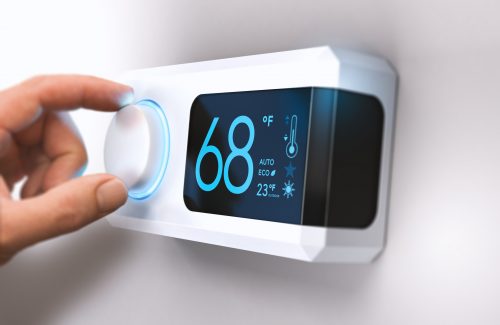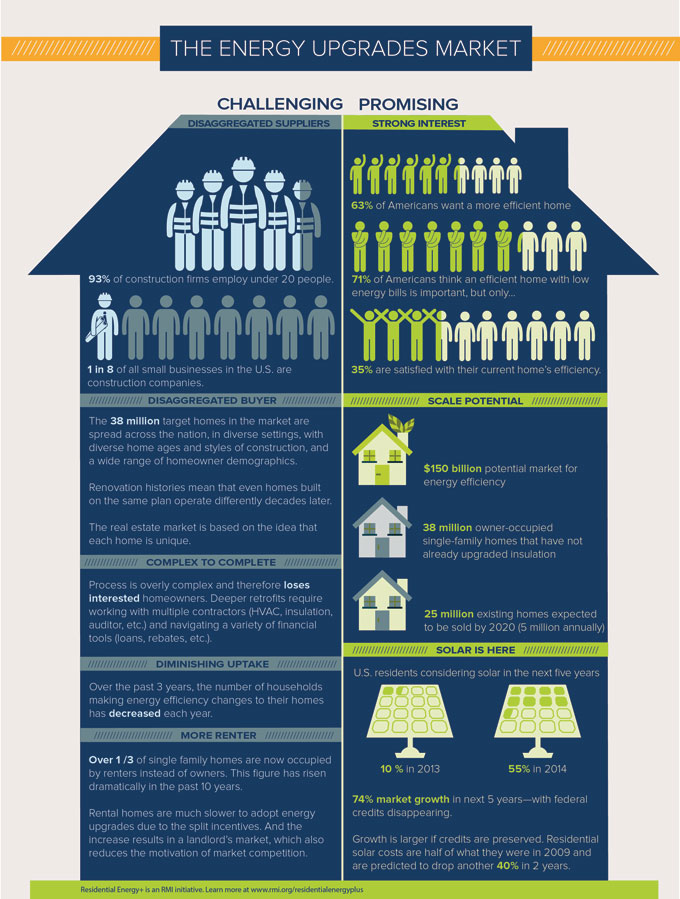
Residential Energy+: Mapping the Future of Home Energy Upgrades
Kitchen remodels are sexy to homeowners. Energy efficiency is not. This simple yet punchy statement shared at the recent Residential Energy+ 2015 Workshop, held just outside Washington, DC, is one of many pervasive assumptions top industry representatives shared for what’s holding back homeowner investment in home energy performance, and failing to make a meaningful dent in the source of one-fifth of U.S. greenhouse gas emissions.
To galvanize efforts unlocking investments in residential energy performance improvements, Rocky Mountain Institute and Carbon War Room convened over 50 market actors and industry experts for an interactive, solutions-focused workshop to jointly set a vision and action plan for market-based solutions to accelerate and scale homeowner investments in energy upgrades in existing single-family homes across the United States.
A collaborative, whole systems approach encouraged partners to suspend conventional assumptions about what’s possible, and ask themselves, “what are the beliefs, values, and assumptions (like the one shared above) that have gotten the industry stuck today, and how can we overcome these conventional models to bring actionable and innovative solutions forward?”
The motivated group of workshop participants, many of whom could be considered competitors outside of the workshop, suspended self interests to co-create powerful market interventions to unlock the U.S. energy upgrades market to produce:
- A new normal by leveraging existing consumer channels to make improved energy use an assumed and aspired standard among homeowners;
- Visible value by making a home’s energy performance available and comparable to others, and connecting this performance to the value of the home; and
- Ready resources by making streamlined, quality energy upgrades convenient for homeowners and profitable for home contractors.
By focusing on these three mutually reinforcing market needs—identified through a survey and dozens of interviews with residential industry leaders and experts—participants laid the seeds for business ventures enabling market actors to capture a share of the $150 billion market for energy performance improvements (which would have even greater potential if the energy savings captured from efficiency measures could then be sold into energy markets like electricity).
ENERGY UPGRADES PROVIDE A BRIDGE TO THE HOMES AMERICANS WANT
Despite some gains over the past few decades, empirical evidence indicates the difficulty of achieving significant energy performance improvements in the U.S. residential sector. It turns out that the supposed low-hanging fruit of climate change mitigation—energy efficiency—is not so low because it necessitates multiple actions among the approximately 51 million single-family homeowners found across the country who concurrently encounter a disaggregated and uncoordinated market for home energy upgrades. As a result, energy upgrades do not seem worth the effort to homeowners, and solution providers do not appear to offer products or services that homeowners like.
Standing in parallel with the meager uptake of energy performance improvements is the fact that Americans increasingly want a constellation of changes to their homes—such as greater comfort, health, connectivity, renewable power, and affordability—that energy performance improvements can fully deliver. The bridge that energy upgrades could provide connecting the current (underwhelming) performance of U.S. homes with what Americans want from their homes appears, however, to be an unknown or insufficiently inspiring narrative to most homeowners.
“There is a disconnect between what programs market and deliver, and what people think they need, to create value in their homes. It’s up to us to develop new and innovative programs that are so attractive and beneficial to homeowners that they are drawn to something they never before knew they wanted or needed.” – workshop participant
Roadblocks exist that prevent homeowners from both taking the first step to cross this bridge and from completing the journey. A homeowner might dismiss the investment immediately due to being unaware of the multiple benefits of energy upgrades, an absence of norms that make high performance a standard expectation, a belief that enough has been done already to improve home energy performance, or a general dissatisfaction with the range of products available in the market today. Alternatively, a homeowner might want to make the investment, but then not complete the process due to a lack of readily available financing, multiple decision-making points (which each contain their own complexities), or underprepared local contractors.
“Today, a homeowner has to interact with every person in this room to perform an energy upgrade. It has to be easier to give people what they want and it’s up to us to strip out the confusion.” – workshop participant
Many factors therefore limit the uptake of energy performance improvements both before and after a homeowner makes a decision to proceed with an investment in energy upgrades—undermining the broader uptake of energy performance improvements nationwide.
Strong attendee engagement at the Residential Energy+ Workshop showed that the most powerful market actors agreed we cannot keep doing the same thing and expect different results.
“We have many of the pieces we need to make a relevant home energy upgrade industry, but we suffer from the inability to get players to play together. Collaborative and organized efforts are needed to get us unstuck, and define where we next go and how we create success.” – workshop participant
BOLD INDUSTRY COLLABORATIONS EMERGE TO UNLOCK HOMEOWNER INVESTMENTS IN ENERGY UPGRADES, BUILDING MOMENTUM FOR BETTER HOMES
Over the course of the workshop, participants identified and coordinated near and long-term opportunities for impactful market interventions aimed at motivating, simplifying, and monetizing homeowner investments in energy upgrades.
Specifically, eight projects were pitched for collaborative, market-based interventions, receiving firm commitments to provide data, time, funds, or expertise from diverse industry representatives with the will and the means to bring ideas to impact.
With a strong coalition ready to collaborate to create a new normal, visible value, and ready resources, the Residential Energy+ 2015 Workshop promises to propel RMI and partners to scale and accelerate energy performance improvements in the U.S. single-family home market.
Now the real work begins. Over the coming months we will continue to foster the relationships formed at the workshop, rapidly test ideas, pursue “quick wins,” and refine solutions generated by continuing to work directly with market actors on exciting opportunities to unlock the residential market and catalyze tangible efforts helping Americans make their homes more comfortable, healthier, smarter, renewably-powered, affordable, and an overall better place to live.
“What will continue to drive us forward is collaboration and good old-fashioned competition. We’re going to have to fight to reach our goal and fight for this industry, but the solutions generated [here] have real teeth to solve the home energy challenge.” – workshop participant
Stay tuned!

